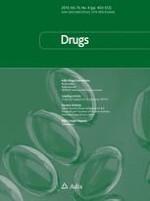Published in:

01-12-2008 | Review Article
Strategies to Improve Adherence and Outcomes in Patients with Ulcerative Colitis
Author:
Dr Sunanda V. Kane
Published in:
Drugs
|
Issue 18/2008
Login to get access
Abstract
This review examines studies of patient adherence to 5-aminosalicylic acid therapy conducted outside the context of a controlled therapy trial, considers the reasons why patients do not adhere to their medication and its consequences, and interventions to improve adherence and disease outcomes. Non-adherence in the inflammatory bowel disease population tends to mirror other chronic illnesses, in the range of 40–60%. Factors that appear to affect adherence include younger age, single status, heavy pill burden, perception of lack of benefit and feeling uninformed about the effect of medication. Three important outcomes of non-adherence include increased risk for disease activity, increased healthcare costs and the possible increased risk of dysplasia/colorectal cancer. Strategies to improve adherence include patient education and ‘health literacy’, along with discussing patient misperceptions and fears on an individual basis, decreasing the daily regimen and switching to high-dose formulations, and incorporating patient self-management techniques into practice.
